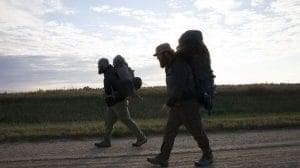
Decades ago I spent the night driving my ex-wife home after we learned that her father had committed suicide that day. As we crossed the Appalachians at dawn she broke down saying “If he’d only made it to sunrise he’d have been ok.” Since that night whenever I’m asked about my goal in life I say “survive until dawn.”
I recalled that night during director Michael Collins documentary Almost Sunrise about soldiers dealing with emotional injury years after returning home from war and the many who commit suicide. Some struggle every night to survive until dawn. Suicides are not counted as combat casualties either in the field or once the soldier returns home.
The film chronicles a walking trip from Milwaukee to Los Angeles. It also chronicles a trip from the hell of war in the Middle East to the peace of functional mental health. It begins with naïveté and wrong headed ideals of heroism and patriotism and ends with a tenuous decision to stay alive every day. Tom Voss and Anthony Anderson have both suffered since they returned home from war and have both considered suicide.

“How can a just God let humans do this to each other?”
The two took on the 2700 mile walk in order to deal with the depression and illness from their experiences at war and try to find a way back.
Tom sees the horrors of his deployments playing in a constant loop in his head. Bloody fragments of bodies and the screaming confusion of firefights. He finds political motivations irrelevant and can only ask “How can a just God let humans do this to each other?” He’s as troubled by decisions made not to help people who needed care as much as he is his own violent actions. Both caused him to break with his own moral code in deeply personal and self inflicted violations.
The film defines and discusses the concept of Moral injury. Moral injury describes extreme and unprecedented life experience including the harmful aftermath of exposure to such events. Events are considered morally injurious if they “transgress deeply held moral beliefs and expectations.”
Both Tom and Anthony found themselves acting against every impulse of humane behavior. More than from war fighting for a righteous cause, as they absorbed the notion that what they were doing was not relevant or justified and they were simply the instruments of a political machine operating at a great distance for vague policy purposes, they incurred deep moral injury as individuals. They were not protecting their families or their country. As thinking men this darkness seeped into them and broke them. The depravity of inflicting suffering and death on other people for no obvious morally supported reason was devastating. Forgiving ones self for breaking these basic tenets of civilized behavior is difficult beyond description. This seems obvious now but is a relatively new idea in treating veterans.
Further, it becomes clear that adaptations necessary in the specialized environment of war do not work in peacetime back home. Acquiring those modes for survival tends to be a one way transformation. One never goes back to being the person one was before. The only option is to integrate the new paradigm and find a way to function in the world. Many vets don’t make it over that hill, driven to suicide when they can’t adapt and aren’t being helped.
Tom and Anthony are justifiably deeply angry people. Collins makes the point that PTSD and moral injury are distinct from each other and suggests that moral injury needs to be addressed separately.

“It becomes clear that adaptations necessary in the specialized environment of war do not work in peacetime back home.”
Taking the 5 months to walk to the coast gives them the space to acknowledge they haven’t adapted and are still living in the nightmare. Each town where they meet new people to support them lets them talk it out a bit more and share it with others who are experiencing problems as well or who simply wish to support them. People walk with them, feed them, house them, and they talk.
It looks exhausting to stay in that emotional place constantly but the point of the documentary is that Tom, Anthony, and anyone suffering these effects doesn’t have a choice. They feel constant rage, pain, and fatigued frustration of a brain that’s been jacked into a constant state of alert awareness and can’t relax. Because of the moral injury they hate themselves as well.
A separate conversation is needed to address the U.S. government’s criminal neglect of veterans who need care after combat. They heal broken bodies, to a degree, and are finally beginning to treat PTSD but they do not address moral injury in any meaningful way.
The film presents, but does not dwell gratuitously on, the horrors seen but rather quietly follows Tom and Anthony in their walking journey back from hell.
This journey explores whether they will get where they need to go, whether they will forgive themselves and heal to the point of being able to have functional relationships with wives, girlfriends, children, and friends.
Will they survive until dawn?

Almost Sunrise (2017) Directed by Michael Collins. Written by Nels Cline, Adam Crystal, Yuka Honda. Starring Tom Voss, Anthony Anderson. In theaters July 14th, 2017.
8 out of 10

[…] “The film presents, but does not dwell gratuitously on, the horrors seen but rather quietly follows Tom and Anthony in their walking journey back from hell.” — Bradley Gibson, Film Threat […]